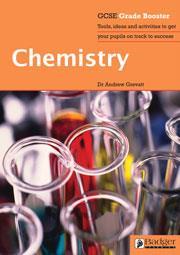Trevor Critchley reviews this booster aimed for C/D borderline students
GCSE grade booster - chemistry
Andrew Grevatt
Stevenage, UK: Badger Learning 2012 | Pp64pp | £59 (PB & CD) | ISBN9781849269247
Reviewed by Trevor Critchley

This book is aimed at supporting students on the C/D grade borderline, though I found it useful for higher grade students as well. It contains many well-structured activities, which could be used either for teaching, revision or formative assessment.
The four sections - knowledge boosters, concept boosters, experiment boosters and argument boosters - are highly appropriate. The first section is rather sparse - it has only some quiz cards, a Haber process diagram to label and a worksheet of covalent bonding diagrams to complete. However the remaining sections have more to offer.
The concept boosters start with some short, simply phrased questions, a list of keywords to define and a sequencing task to help students consider how they structure their explanations. Once the essential content has been met, three longer response questions of increasing demand follow. The one weakness here is that only a generic mark scheme is given, not dissimilar to the unhelpful 'mark by impression' schemes currently issued by some of the examination boards. Something unique for each activity would probably be far more useful to enable teachers to give their students constructive and specific feedback.
The experiment boosters contain some really helpful activities on interpreting charts and diagrams, simple calculations and one particularly good page on the correct use of units.
The argument booster section covers some familiar territory - plastics, burning fuels, limestone and nanotechnology. The idea is good - a simple piece of background reading and then three different styles of question requiring students to weigh up the pros and cons in different ways. The questions are superficially similar, but will make good training for students in the art of reading the question and tailoring their answer to what is being asked, rather than waffling. For example, in quarrying, the questions are: 'describe the advantages and disadvantages of quarrying', 'write an argument for the environmental issues against quarrying' and 'discuss whether it can be justified to quarry for limestone in a national park'. The differences are subtle, but can stimulate quite a high level of discussion.
On the whole I would recommend this book as a source of ideas.
Related Links
GCSE grade booster - chemistry
Andrew Grevatt






No comments yet